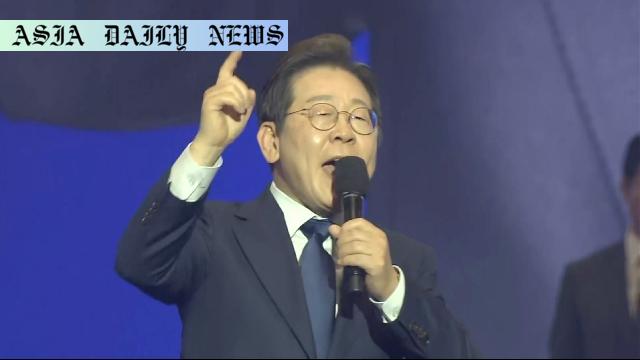Presidential Election – South Korea’s Democratic Party nominates Lee Jae-myung as their strong presidential candidate.
South Korea’s Democratic Party selected Lee Jae-myung as their candidate for the upcoming presidential election.
Lee secured a decisive 90% of votes in regional primaries, showcasing broad support within the party.
The ruling People Power Party is set to announce their candidate by May 3, sparking intense political momentum.

Lee Jae-myung: A People’s Candidate
South Korea’s political scene took a dynamic turn as the Democratic Party of Korea confirmed Lee Jae-myung, a former party leader, as their candidate for the upcoming presidential elections on June 3. This announcement follows the impeachment and removal of former President Yoon Suk-yeol in April, adding historical significance to this election cycle. Garnering a remarkable 90% of votes during regional primaries, Lee’s selection signifies overwhelming support from party members and affiliates. His campaign centers around creating a ‘new South Korea,’ with aspirations to position the nation as a global leader.
Lee is no stranger to public attention. Known for his candid and charismatic communication style, he narrowly lost the last presidential race to Yoon Suk-yeol, showing resilience in his political pursuits. Despite past criticisms over his critical stance toward Japan, Lee has recently emphasized the importance of cooperation and mending economic and cultural ties with South Korea’s neighbor. This evolving narrative reflects his adaptability and determination to address longstanding regional disputes strategically.
Democratic Party’s Strategic Strength
Historically, the Democratic Party’s strength lies in its grassroots mobilization and internal cohesion, as evidenced by the smooth execution of regional primaries. These week-long assemblies culminated in an electrifying finale near Seoul, showcasing the party’s dedication to democracy and transparency. The overwhelming support for Lee signals a collective desire for progressive yet pragmatic leadership, particularly in economically precarious times. Lee’s vision for governance is based on inclusivity, innovation, and forging stronger global alliances, resonating deeply with a diversified electorate.
Lee’s campaign is expected to focus on revamping South Korea’s social and economic systems and tackling pressing challenges like unemployment and housing shortages. His promise to bridge regional and global divides by fostering mutual cooperation marks a crucial step forward, especially given the strained dynamics in East Asia. Lee’s gesture to seek collaboration with Japan, while acknowledging historical disputes, underscores his diplomatic flexibility and forward-thinking approach.
Ruling Party Faces Tight Deadlines
On the other side of the political spectrum, the ruling People Power Party is on the cusp of finalizing their candidate. With a deadline set for May 3, the party has a tight window to coalesce around a leader who can rival Lee’s overwhelming popularity and party-wide support. The four contenders from the People Power Party include a mix of seasoned politicians and technocrats, such as a former municipal chief and a cabinet member, infusing complexity and intrigue into the selection process. Prime Minister Han Duck-soo, currently serving as the acting president, emerges as a strong contender due to his managerial acumen and policy credibility. However, the ultimate choice could significantly shape the dynamics of the electoral battleground.
This intense political moment in South Korea follows the dramatic impeachment of President Yoon Suk-yeol for declaring martial law in December, a move that fueled national unrest. As the People Power Party navigates its internal dynamics, it faces the dual challenge of rallying public trust and presenting a compelling vision that resonates with voters on issues like governance, reform, and stability.
A Nation at a Crossroads
South Korea’s forthcoming presidential election offers voters a starkly contrasting vision for the nation’s future. On one side, Lee Jae-myung represents progressive change, seeking to reshape South Korea’s policy framework and global standing. On the other, the People Power Party’s anticipated candidate may focus on conservative values and measured governance to appeal to a nation seeking a safe and steady recovery post-impeachment.
The political scenario hints at high voter turnout, driven by enhanced public engagement and the symbolic weight of this election. With less than two months left, political campaigns are gearing up for intense debates, rallies, and policy declarations that will determine the direction of South Korea in the years to come.



Commentary
Democratic Party’s Strong Move
South Korea’s Democratic Party has made a bold and decisive move by nominating Lee Jae-myung as their presidential candidate. In a political atmosphere marked by uncertainty following President Yoon Suk-yeol’s impeachment, Lee embodies a refreshing commitment to progressive reform and strategic leadership. His ability to secure 90% of the party vote speaks not only to his popularity but also to the faith the party and its supporters place in him to navigate these challenging times effectively.
What makes Lee stand out is his nuanced approach to diplomacy, especially regarding long-standing issues with Japan. By emphasizing the importance of economic and cultural cooperation beyond historical disputes, he signals a mature and futuristic perspective. This mindset could prove instrumental in fostering regional stability while addressing national priorities. His leadership style, combining candid communication with strategic foresight, may appeal to younger, forward-thinking voters and traditional Democratic Party supporters alike.
Challenges for the People Power Party
The People Power Party faces an uphill battle as it scrambles to finalize its presidential candidate. With internal divisions and varied contenders, the party must coalesce quickly to present a unified front and articulate a vision compelling enough to rival Lee’s popular candidacy. The current acting president and Prime Minister Han Duck-soo stands out as a pragmatic choice, given his administrative expertise and reputation for efficiency. However, whether Han or another candidate can galvanize voter enthusiasm remains to be seen.
This election is shaping up to be a defining moment for South Korea’s democracy. It reflects not only political realignments but also the deepening engagement of an electorate keenly aware of the significance of its choice. As the parties refine their strategies and platforms, citizens and observers alike should prepare for a contest that could reshape South Korea’s regional and global outlook.